IELTS Speaking: Sports Vocabulary, Idioms, and Sample Answers
Sports is one of the most common topics in the IELTS Speaking test, so it pays to have a rich vocabulary ready. IELTS experts note that “sport is an important part in many of our lives and is a topic that often comes up in the test”. Even if you’re not a big athlete, you should be prepared to talk about sports and physical activities. Using the right words – from everyday sports to niche terms – can help you score higher by showing a wide range of vocabulary. For example, knowing the correct verbs (we play football, go swimming, do yoga) and idioms (like be a good sport) can boost your lexical resource score.
Score Tip: Remember basic collocations. As one IELTS tutor explains: “we play football and rugby, but we go hiking and do yoga”. In other words, use play with team ball games, go with sports ending in “-ing” (swimming, hiking), and do with individual exercises or martial arts. We’ll cover these and more below, along with idioms and sample answers for Parts 1, 2, and 3.
Common Sports and Activities
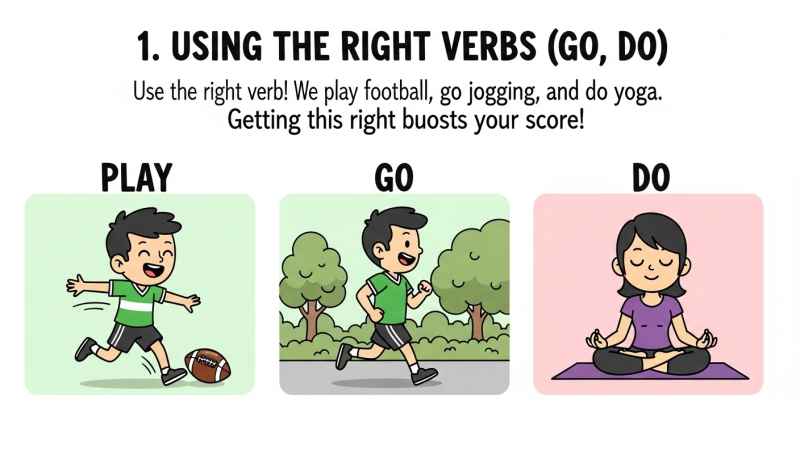
Start by learning the names of common sports and the correct verbs or phrases to talk about them. For instance, football, basketball, and hockey are team sports we play. On the other hand, we go swimming, go jogging, and go climbing. If you do exercise or martial arts, you might do yoga, do pilates, or do karate. Here are some useful collocations and notes:
- Play + team sports: play football, play tennis, play badminton (note tennis court, football pitch). For example: “I started playing hockey in school every winter”.
- Go + –ing sports: go swimming, go jogging, go cycling, go hiking. Example: “I go jogging with my friends every morning in the park”.
- Do + exercises: do yoga, do tai chi, do exercise, do aerobics. These are used for workouts and fitness classes. E.g. “I do weight training classes to keep fit”.
- Take part in / participate in: These general phrases cover any sport. E.g. “I take part in school sports day events”.
It helps to know a mix of popular and niche sports. Common options include football (soccer), basketball, cricket, tennis, swimming, running, and cycling. Some countries love specific sports: for example, “The UK is a nation of football fans (soccer)”. Others might mention hockey or rugby (played with sticks/pucks and balls) or badminton and table tennis for indoor sports. Don’t forget extreme sports if you like them: words like bungee jumping, rock climbing, skydiving show advanced vocabulary (see Jacky’s IELTS tips).
When discussing popularity, note that football/soccer is often the top sport. For instance, a sample answer says: “Football is the most common sport in my country… it doesn’t cost much to play or watch, and many people enjoy it”. Similarly, if asked “Which sports do you enjoy?”, you might answer: “I’m an avid sports fan – I sometimes watch games on TV, but I prefer taking part in sports myself”.
Keep in mind the right prepositions: we play sports at the gymnasium or stadium, and go to a sports centre or go on a running track. In fact, “sports facilities” (gyms, tracks, pools) are mentioned by one candidate as being plentiful in towns.
Equipment and Training
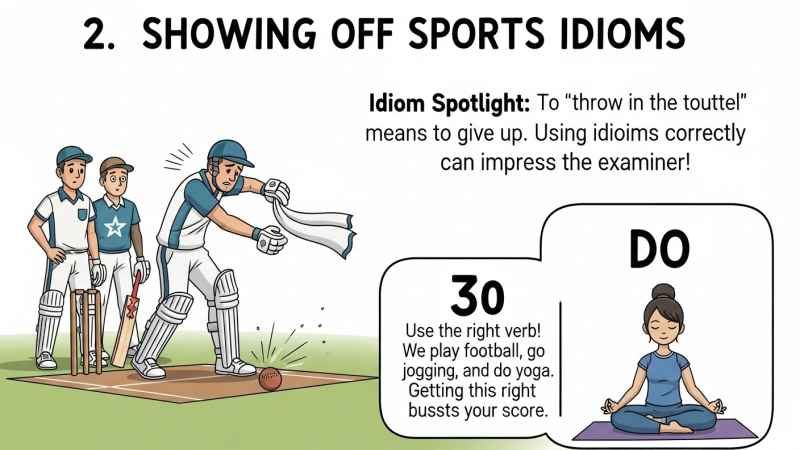
Learning vocabulary for training, exercise, and equipment will help you answer questions about fitness. Common terms include keep fit (stay healthy), get into shape (become fit), fitness program/fitness fanatic (planned exercise routine/obsessive about exercise), and sports facilities (gyms, courts, etc.). For example, a model answer says: “Every town has a range of sports facilities including fitness centres, gyms and swimming pools”.
Another key word is strenuous exercise. This means a workout requiring a lot of effort. For example: “I used to hate strenuous exercise, but now that I jog regularly I really enjoy it”. Related verbs/phrases include warm up, cool down, train hard, and work out. All of these are phrasal verbs or collocations you should know (see section below).
Lifting weights is a common way to get fit. In the gym you might use a barbell (a weight-lifting tool) to build muscle. A phrase like build muscle is useful: “John was very skinny five years ago, but now he has built muscle and looks really strong”.
Cardio equipment is another category. For example, a treadmill (pictured above) is an exercise machine you run on indoors. Sentences like “I run on the treadmill to improve my fitness” show you know gym vocabulary. Other common items are dumbbells, elliptical machines, stationary bikes, and rowing machines (see Jacky’s sample: “I train on the water with my rowing crew”).
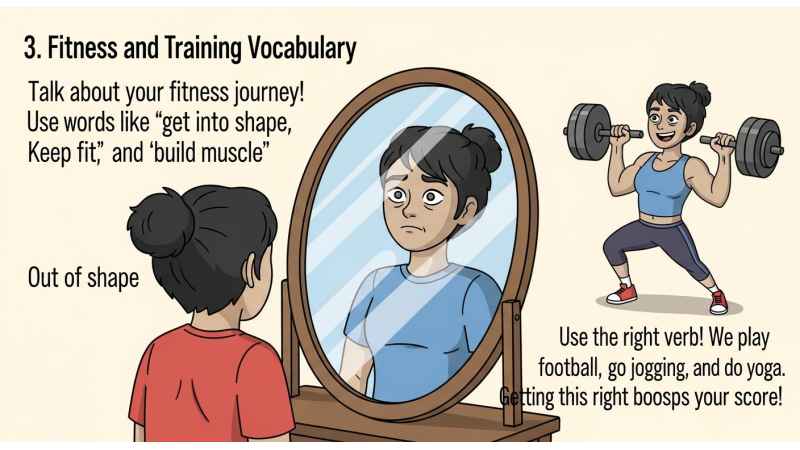
Here are some other useful phrases related to fitness and training:
- Keep fit – stay healthy by exercising (e.g. “I do several things to keep fit: jogging, rowing, weight training…”).
- Get into shape / in shape – become physically fit (e.g. “She wanted to get into shape, so she started cycling to work”).
- Get out of shape / out of condition – become unfit (e.g. “Lily hasn’t been training for years; she is really out of condition now”).
- Personal best – your own record (e.g. “I ran 10km in 50 minutes today – that’s my personal best!”).
- Strength-training/build strength – exercises to increase muscle (e.g. “He follows a strength-training strategy at the gym”).
- Sports centre / fitness centre – a place for exercise (Jacky: “I practise fencing at a local sports centre”).
- Sports facilities – gym equipment, fields, pools etc. (e.g. “A wide range of sports facilities helps people stay active”).
- Brisk walk / go for a run / go cycling – idiomatic ways to talk about exercise. For light exercise, one candidate mentions “brisk walking is one of the best ways to maintain our health”.
Idioms and Phrasal Verbs
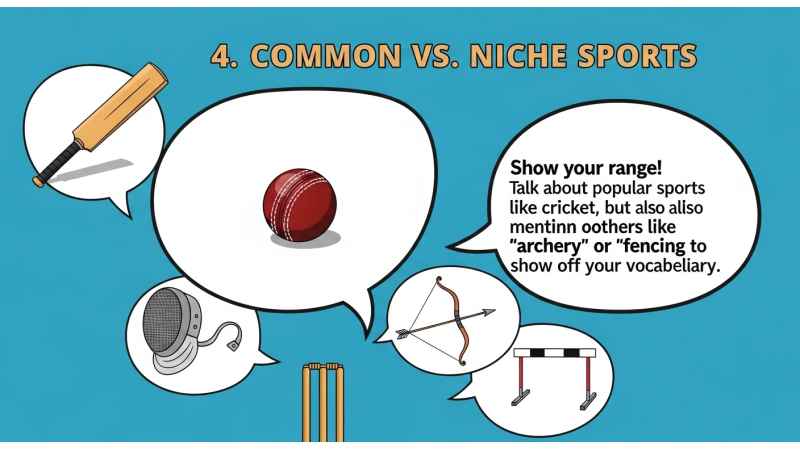
Using idioms and phrasal verbs can impress examiners. Below are some common sports-related idioms and phrasal verbs, with example meanings:
- be a good sport (idiom) – stay cheerful when losing or facing difficulty. “Even after losing, he was a good sport and congratulated the winners”.
- jump the gun – act too soon. “I jumped the gun by entering the marathon without proper training”.
- hit below the belt – do something unfair or mean. “The coach said the player hit below the belt with his harsh comments”.
- throw in the towel – give up. “After losing five games in a row, the team finally threw in the towel”.
- go the extra mile – put in more effort than expected. “She always goes the extra mile in training, so she became captain”.
- level the playing field – make a situation fair. “Introducing youth leagues has helped level the playing field in sports”.
- give it your best shot (idiom) – try your hardest.
- get a second wind – regain energy after fatigue. “I was exhausted after running 3 km, but I got a second wind after I passed the beach”.
- on the ball – be quick and alert (from baseball). “The new player is really on the ball when it comes to answering the coach’s questions”.
- the ball is in your court – it’s your turn to act (from tennis). “I’ve done all I can – now the ball’s in your court.”
- blow the competition away – win easily. “After seven years of training, he blew the competition away”.
- neck and neck – very close contest.
- give [someone] a run for [their] money – make someone compete strongly.
- call the shots – be in charge of decisions.
- take (something) up – phrasal verb: start a new sport/hobby. “I have always wanted to take up archery and finally joined a club”.
- warm up / cool down – ease into or out of exercise. “We always warm up before a workout and cool down afterwards”.
- work out / work out – exercise at the gym (or do a workout). “She works out four times a week with weights and cardio”.
- train hard / work hard at – practice intensely.
- keep (someone) on their toes – keep someone alert (idiom, not sport-specific).
- fall behind / get behind – fail to keep up pace.
Many of these come up in everyday English too. In fact, sources note that “sports idioms generally originate from a specific sport… but over time they have come to mean something in everyday life”. Using them naturally in answers can demonstrate flexibility: e.g. “She gave it her best shot in the race and still lost – but she remained a good sport”.
Speaking Part 1: Sample Questions & Answers
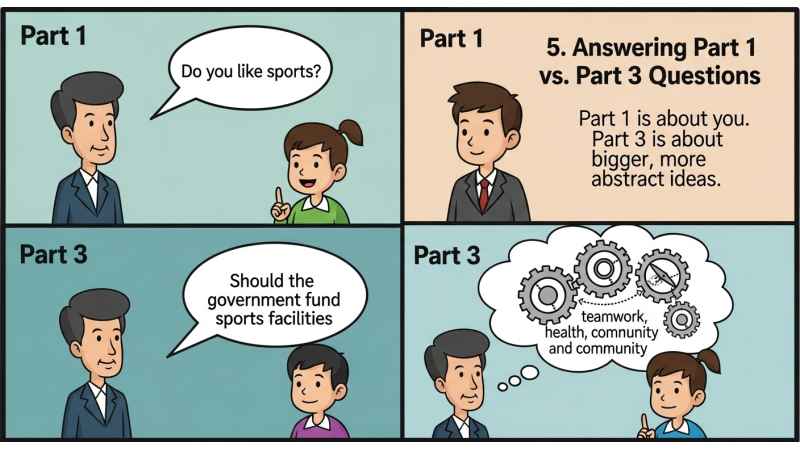
In Part 1, the examiner asks simple, personal questions about sports. Here are some typical Q&A examples using sports vocabulary:
Q: Do you play any sports? A: “Absolutely! I’m a big sports fan. I play football with my friends after school almost every day. It’s a lot of fun, and it keeps me fit”.
(This uses verbs play + sport, and words like sports fan, keep fit.)
Q: Which sports do you watch on TV? A: “I watch football matches on TV most weekends. I’m a huge football fan, so I rarely miss games – even away games of my favorite team”.
(Keywords: football fan, watch matches, “home games”).
Q: What sports did you do at school? A: “At my school, sports were very popular. I played hockey during the autumn and spring, and in the summer months we did athletics, including cross-country running”.
(Shows past tense played, did, and names of sports.)
Q: How important is keeping fit to you? A: “Keeping fit is a very important part of my life. In fact, my friends say I’m a bit of a fitness fanatic. I exercise regularly – I go jogging and also lift weights to stay in good shape”.
(Vocab: keep fit, fitness fanatic, jogging, stay in shape, lift weights.)
Q: What do you do to keep healthy? A: “I do several things. I take weight training classes, I go jogging in the park, and I often train on the river with my rowing team. Also, I walk my dog twice a day to stay active”.
(Grammar: present simple, a list of activities, multi-part answer.)
Each answer above includes sports terms and shows fluency. You can adapt these ideas to your own sports. Always try to extend your answer with a reason or detail – this adds depth and vocabulary.
Speaking Part 2: Sample Cue Card & Answer
In Part 2, you give a 1–2 minute talk on a given topic. Here’s an example cue card and a model response:
Cue Card: Describe your favourite sport. You should say:
- – what the sport is,
- – how often you play or watch it,
- – how you play it,
- – and explain why it is your favourite sport.
You might answer like this:
“My favourite sport is football. I’ve been playing it on and off since I was a child. In fact, I can’t even remember when I started – I played all the way through primary school, then gave it up in secondary school, and picked it up again at university. Now that I’m older, I play football quite often with my friends to stay as fit as possible. We usually play five-a-side games in the local park.
I like football for many reasons. First, it’s a great game popular all over the world – it’s easy to learn and play. I also enjoy the camaraderie of being on a team – everyone works together to score goals. Football gives me a real sense of achievement when I play well, and of course it’s a fun way to get exercise (especially on a sunny day!). All in all, these reasons add up to making football my favourite sport.”
This answer uses a range of expressions: “favourite sport”, “playing it on and off”, “primary school”, “give it up”, “stay as fit as possible”, “five-a-side”, “camaraderie”, “sense of achievement”. Notice it also answers each bullet in the cue card. You should practice a similar 2-minute speech about any sport you like or even a memorable sports event you attended.
Speaking Part 3: Sample Questions & Answers
In Part 3, the questions are more abstract and analytical. They often ask why or how things are the way they are. Here are some example Part 3 questions on sports, with sample points in the answer:
Q: Do you think children should compete in sports at school? A: “Yes, I definitely think competitive sports can be beneficial. In school and life, competition is inevitable, and playing sports teaches children how to cope. For example, even if losing stings, kids learn to be gracious winners and strong losers. They also learn teamwork, discipline, and perseverance, which are valuable in any field.”
(Vocabulary: competitive, gracious winners, strong losers, perseverance.)
Q: What are the benefits of international sporting events? A: “International competitions have major benefits. Firstly, they bring people together – fans from different countries unite behind their teams, which builds relationships across cultures. For instance, Andrew Turner notes ‘international sporting events bring whole countries together behind one banner’. Secondly, seeing top athletes compete is inspiring – it often leads to new world records and personal bests. Finally, big events encourage people (especially the young and disabled) to get involved in sport. Coverage of the Paralympics, for example, has ‘led to a massive increase in people with disabilities taking up sports’, which can be life-changing.”
(This answer cites the idea of unity, inspiring athletes, records, and social impact.)
Q: Do you think people today exercise enough? Why or why not? A: “In many countries, most adults don’t get enough exercise. This is clear from rising obesity rates – people are often out of condition. We have more knowledge than ever about the health benefits of keeping fit, yet many people prefer sedentary lifestyles. Towns do have sports facilities (like gyms and parks), but busy work schedules mean people make excuses. As one model answer puts it, ‘there really isn’t any excuse not to take at least some exercise every day’. Encouraging active travel (walking or cycling to work) and community fitness programs could help solve this.”
(Vocab: obesity, sedentary, out of condition, facilities, active travel.)
Q: Should governments encourage people to do sports? How? A: “Definitely yes. Government campaigns can highlight that sports are a form of recreation that reduces stress and improves health. In one example, an IELTS answer noted that sports allow people ‘to reduce stress significantly’ in today’s high-pressure world. Also, building new parks, subsidizing gym memberships, or organizing free community events can make exercise more accessible. Schools also play a role – by including sports days and clubs, they instill a habit of activity early on.”
(Vocab: campaign, stress reduction, recreation, subsidize, community events.)
When answering Part 3, aim to give reasons and examples, and use some complex phrases: “In my opinion…”, “I believe…”, “for instance…”, “this is because…”, etc. Citing research or statistics is not needed, but speaking naturally and logically is key. Remember to use some advanced vocabulary and idioms where appropriate to maximize your score.
Other Specific Sports Vocabulary
Apart from common words, using more niche sports terms can set you apart. Mentioning less common sports or events shows breadth. Here are some examples:
- “Fencing” is a sword-fighting sport using foils or sabres. You could say “I once watched a fencing match and was impressed by the athletes’ agility.”
- “Hurdles” is a track race involving jumping over barriers. For example, “She trained for the 100m hurdles event in school athletics.”
- “Javelin throw” involves throwing a long spear (javelin) for distance. You might mention “I am learning to throw the javelin as part of my track training.”
- “Pole vault” is an event where an athlete uses a long pole to clear a high bar. One could say “I attended a meet and saw a pole vault competitor soar over the bar.”
Other advanced terms: steeplechase (a race with obstacles, often on horseback), rugby, archery, gymnastics, weightlifting, marathon, triathlon, tournament, regatta. Even if you don’t play these, mentioning them (even in passing) can earn you credit for variety. For example: “I admire archers and even went to an archery club to try it out”, or “During the Olympics I follow gymnastics and track and field closely.” These show off your vocabulary range.
Conclusion
Improving your IELTS sports vocabulary involves both learning words/idioms and practicing answers. As Nehasri Ravishenbagam (IELTS trainer) points out, studying a topic like sports in all parts of the test helps you use the terms naturally. Practice by organizing words into themes (e.g. equipment, training, sports names) and using them in speaking drills. Record yourself, get feedback, and refine your phrasing. With the right mix of common terms (football, gym, keep fit) and niche vocabulary (javelin, be a good sport, get a second wind), you’ll be well-prepared for any sports question in IELTS Speaking. Good luck, and have fun with this topic!

About the AuthorWelcome to TechIELTS. I’m Md. Jahangir Alam, an experienced engineer with over 15 years in electrical and automation systems. Alongside my engineering career, I’ve developed a strong interest in English language learning and IELTS preparation.
I hold a Duolingo English Test score of 135 (IELTS 7.5 equivalent) and am currently pursuing an M.Sc. in Cyber Security from Royal Holloway, University of London. I use my technical background to create clear, structured IELTS learning materials for students and professionals.
👉 Connect on LinkedIn
